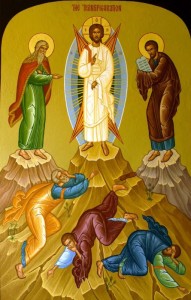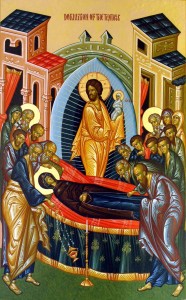 Today is the Feast of Transfiguration in the Orthodox Church. (Read about this feast at the icon here.) I went to Vespers at St. John Orthodox Church here in Memphis last night, which was beautiful. The icon of Transfiguration at dusk made the reality of what was happening on Mount Tabor more tangible, which is one of the things I love about the Orthodox Church. It offers an embrace for all the senses, with prayerful chanting, incense, and the glow of candlelight on the gold leaf halos of the icons. I wasn’t feeling well this morning, so I didn’t make it to Liturgy for the feast. But at home I prayed before our icons and thanked God for the way He is transforming me into His image, which is what this feast is all about
Today is the Feast of Transfiguration in the Orthodox Church. (Read about this feast at the icon here.) I went to Vespers at St. John Orthodox Church here in Memphis last night, which was beautiful. The icon of Transfiguration at dusk made the reality of what was happening on Mount Tabor more tangible, which is one of the things I love about the Orthodox Church. It offers an embrace for all the senses, with prayerful chanting, incense, and the glow of candlelight on the gold leaf halos of the icons. I wasn’t feeling well this morning, so I didn’t make it to Liturgy for the feast. But at home I prayed before our icons and thanked God for the way He is transforming me into His image, which is what this feast is all about
Eight years ago I wrote a post about this:
“Can People Change?” (Click on the link to read the post.)
And then six months ago, on my birthday (March 8) I did a follow-up post:
“Birthday Musings: People Can Change” #sixmonthswithoutadrink
I don’t really have much to add today, except that I am full of joy and thanksgiving for the way that God is helping me to change as I grow older. In case you aren’t taking time to click on one of the links above and re-read those posts, I’m going to share my favorite quote from Dr. Jamie Moran’s essay, “Orthodoxy and Modern Depth Psychology,” in the book, Living Orthodoxy in the Modern World:
People who leave a space for God—even for the ‘hidden’ God, which is what the Holy Spirit is: God’s humility—can be helped, and can change. They can learn to live with the most extreme damage and suffering and yet still find joy in life…. People who leave a space for God are able to make that change of heart, not for any sentimental reason or out of any moral superiority, and certainly not because of what is conventionally called piety, but because and only because, despite their selfishness, they truly acknowledge and have faith in a force that is greater than themselves. They are willing to open their selfishness up to that greater force, and in opening its closed system, to begin to let life teach it its mistakes and heal its wound, and comfort its genuine suffering.
 I love that this feast comes half-way through the Dormition Fast, because the Mother of God plays a big part in our transfiguration, in our change. In his homily yesterday Father John Troy (Mashburn, our pastor emeritus) talked about healing, and how we must come to Jesus for healing, or someone must bring us to Jesus. I started thinking about HOW to bring people to Jesus for healing, especially if they don’t physically come to church. I remembered what my “yia-yia” Urania Alissandratos told me years ago when she was still living and “mothering” so many of us at St. John. When her children left home for college, she would “bring them to God” by symbolically bringing them to the Mother of God and leaving them in Her care. She did this symbolically by decorating her icon on the solea at church with flowers every year on the Feast of the Dormition (falling asleep) of the Mother of God. At Vespers last night, I found myself praying for loved ones who weren’t there by bringing them to the Mother of God, mentally, spiritually, even physically and emotionally as I wept tears for them. We all need healing, and I know several people who have “brought” me to Christ and to His Mother for healing over the years. I hope that I am paying that forward by bringing others to Him in my prayers. I look forward to another opportunity to do that tonight, as we pray the Paraclesis Prayers to the Mother of God at St. John.
I love that this feast comes half-way through the Dormition Fast, because the Mother of God plays a big part in our transfiguration, in our change. In his homily yesterday Father John Troy (Mashburn, our pastor emeritus) talked about healing, and how we must come to Jesus for healing, or someone must bring us to Jesus. I started thinking about HOW to bring people to Jesus for healing, especially if they don’t physically come to church. I remembered what my “yia-yia” Urania Alissandratos told me years ago when she was still living and “mothering” so many of us at St. John. When her children left home for college, she would “bring them to God” by symbolically bringing them to the Mother of God and leaving them in Her care. She did this symbolically by decorating her icon on the solea at church with flowers every year on the Feast of the Dormition (falling asleep) of the Mother of God. At Vespers last night, I found myself praying for loved ones who weren’t there by bringing them to the Mother of God, mentally, spiritually, even physically and emotionally as I wept tears for them. We all need healing, and I know several people who have “brought” me to Christ and to His Mother for healing over the years. I hope that I am paying that forward by bringing others to Him in my prayers. I look forward to another opportunity to do that tonight, as we pray the Paraclesis Prayers to the Mother of God at St. John.